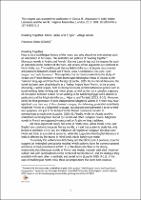Chapter Reading together
Hindu, Urdu and English Village Novels
Author(s)
Orsini, Francesca
Collection
European Research Council (ERC); EU collectionLanguage
EnglishAbstract
Every region of India is and has been multilingual, with speakers of
different languages and speakers of multiple languages. But literary
‘multilingual locals’ are often more fragmented than we think. While
multilingualism suggests interest, and proficiency, in more than one literary
language and tradition, very real barriers exist in terms of written vs. oral
access, mutual interaction, and social and cultural hierarchies and
exclusions. What does it mean to take multilingualism seriously when studying
literature? One way, this essay suggests, is to consider works on a similar
topic or milieu written in the different languages and compare both their
literary sensibilities and their social imaginings. Rural Awadh offers an
excellent example, as the site of many intersecting processes and
discourses—of shared Hindu-Muslim sociality and culture and Muslim
separatism, of nostalgia for a sophisticated culture and critique of
zamindari exploitation and socio-economic backwardness, as the home of Urdu
and of rustic Awadhi. This essay analyses three novels written at different
times about rural Awadh—one set before 1947 and the others in the wake of
the Zamindari Abolition Act of 1950 and the migration of so many Muslim
zamindars from Awadh, either to Pakistan or to Indian cities. The first is
Qazi Abdul Sattar’s Urdu novel Shab gazida (1962), the other two are
Shivaprasad Singh’s Alag alag vaitarani (1970) and the Awadh subplot in
Vikram Seth’s A Suitable Boy (1993). Without making them representatives of
their respective languages, by comparing these three novels I am interested
in exploring how they frame and what they select of Awadh culture, how much
ground and sensibility they share, and how they fit within broader traditions
of ‘village writing’ in Hindi, Urdu, and Indian English.
Keywords
Oral; tradtion; local dialect; tenant; farmer zamindar; Urdu; HindiDOI
10.1057/978-1-137-54550-3_3OCN
1135846688Publisher
Springer NaturePublisher website
https://www.springernature.com/gp/products/booksPublication date and place
Basingstoke, 2017Grantor
Imprint
Palgrave MacmillanClassification
Language and Linguistics


 Download
Download